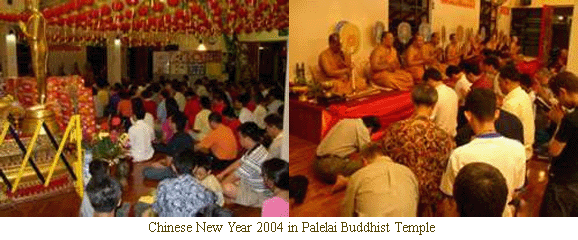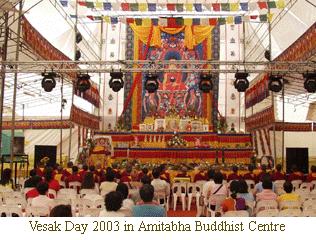The Buddhist new year depends on the country of origin or the ethnic background of the people.
As for the Chinese , they celebrate late January or early February according to the lunar calendar.

Festival And Events
Buddhist New Year / Chinese New Year
|
|
The Buddhist new year depends on the country of origin or the ethnic background of the people. |
|
|
As for the Chinese , they celebrate late January or early February according to the lunar calendar.
|
Vesak or Visakah Paja (Buddha Day)
|
|
Buddha's Birthday is know as Vesak or Visakah Puja (Buddha's Birthday Celebration). |
|
|
It is the major Buddhist festival of the year as it celebrates the birth, enlightenment and death of the Buddha in one day, the full moon day in May except the leap year when the festival is held in June. |
|
|
Vesak is the name of the month in Indian calendar. |


Avalokitesvara (Kuan Yin) Birthday
|
|
It is a festival celebrates the Bodhisattva ideal represented by Avalokitesvara. |
|
|
It represents the perfection of compression in the Mahayana traditions. |
|
|
It occurs on the full moon day in March. |
|
|
Buddhist devotees all over the world bathed the statue of Buddha to express their allegiance to the person who was willing to give up his life of luxuries as a Crown Prince for a peasant lifestyle so he could benefit and comfort the poor. |
|
|
In Singapore, the day begins with meditation by monks and devotees alike in Buddhist temples followed by the freeing of caged birds and animals, visiting and giving gifts to the poor or blood donation at hospitals organised by Buddhist youths. |
Ulambana (Ancestor day) or Hungry Ghost Festival
|
|
It celebrates from the first to the fifteen days of the eighth lunar month. |
|
|
It is believed that the gates of Hell are opened on the first day and the ghost may visit the world fro fifteen day. |
|
|
Food offering are made during these time to relieve the suffering of these ghosts. |
|
|
On the fifteen day, Ulambana or Ancestor Day , people visit cemeteries to make offering to the departed ancestors. |
Magha Puja Day (Fourfold Assembly or Sangha Day)
|
|
Magha Puja Day is on the full moon day of the third lunar month (March). |
|
|
This day is observed to commemorate an important event in the life of the Buddha. |
|
|
This event occurred early in the Buddha's teaching life.
|
Kathina Ceremony (Robe offering ceremony)
|
|
It is held on any convenient date within one month of conclusion of the Vassa Retreat which is the three month rains retreat season (Vassa). |
|
|
It is the time when new robes and other requisties offered by the laity to the monks.
|
Abhidhamma day
|
|
The occasion when the Buddha is said to have gone to the Tushita heaven to teach his mother the Abhidhamma. |
|
|
It is held on the full moon of the seventh month of Burmese lunar year starting in April which corresponds to the full moon day in October. |
Pavarana Day
|
|
It means the conclusion of the Rains retreat (vassa). |
|
|
The following month, kathina ceremony is held. |
|
|
During the laity gather to make formal offering of robe cloth and other requisties to the Sangha. |
Loy Krathong (Festival Of Floating Bowls )
|
|
At the end of Kathin Festival season ,when the river is full of water , Loy Krathong takes place on the full moon night of the Twelfth Lunar month. |
|
|
People brings bowls made of leaves, candle and incense sticks and let them float in water. |
|
|
As they go, all bad luck is suppose to disappear. |
|
|
The practice of Loy Krathong means to pay homage to the holy footprints of the Buddha. |
Anapanasati Day
|
|
At the end of one rains retreat (vassa), Buddha was pleased with the progress of the assembled monks. |
|
|
He encouraged them to extend their retreat for yet another month. |
|
|
On the full-moon day marking of that fourth month of retreat, he presented his now-famous instructions on mindfulness of breathing (anapanasati). |
|
Festivals |